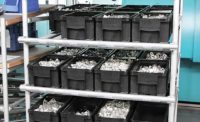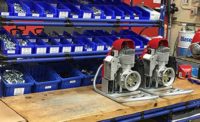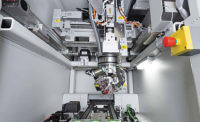Early in 2011, instrumentation manufacturer Dynisco Inc. implemented a four-year continuous improvement program to help the company and its subsidiaries (Viatran, Alpha Technologies, DJ Instruments and DVI) meet ongoing challenges at several regional and international plants.
The challenges include: eliminating cost from new product designs, reducing the cost of carrying inventory, increasing control over operating profit and cash flow, enhancing efficiency and productivity from existing resources, and improving networking among the plants.
Dynisco collaborated closely with consultant Macresco Edge to develop the program, which was implemented first at company headquarters in Franklin, MA, and then at one plant for each susidiary. The program requires the creation of a pilot cell at each facility to assess production processes based on product mix and volume, management practices and employee engagement. Each cell also serves as a model for a future production line to be implemented companywide.
The program’s initial focus was having company managers understand and implement design for manufacturing and assembly (DFMA) best practices. With the help of Boothroyd Dewhurst Inc.’s DFM and DFA product-costing software, Dynisco simplified its new-product designs, standardized related cost drivers and improved supplier management while maintaining flexibility.
Despite these advances, problems remained with inventory lead times and quality. Equally important, higher productivity was destabilizing the company’s postponement method of stocking lesser amounts of generic material for subassemblies. The subassemblies are still considered inventory; however, less value, in the form of labor and materials, has been applied at this stage.
To eliminate these problems, Dynisco implemented a manual kanban system. Although the system eased material flow, improved client response times and doubled revenue output at impacted cells, it failed to reduce replenishment inventory by 30 percent, which was Dynisco’s goal.
At the beginning of 2014, company managers replaced the manual kanban system with SyncKanban software made by Synchrono Inc. The software uses real-time demand signaling to instantly track lead- and replenishment-times and optimize inventory levels. It also easily integrates into the company’s existing ERP system and provides the extensive data required for detailed cost management and supplier oversight.
Dynisco and its subsidiaries like that the software requires only six kanban steps (compared to 66 in the manual system) to provide accurate inventory and supplier data. By responding instantly to changes in demand, the software maintains minimal inventories for nearly 800 SKUs for products built by these five companies across several facilities and geographical areas.
Over the past 15 months, SyncKanban has reduced replenishment inventory an average of 40 percent for each company—saving them a combined $985,000. Two subsidiaries reduced inventory and related costs by 55 and 51 percent, respectively.
Another subsidiary improved its inventory turnover ratio by 91 percent. One company tracks 94 percent of all materials with SyncKanban and says the software has reduced lead time from 12 weeks to two, resulting in millions of dollars of increased revenue.
Established in 1953, Dynisco makes materials-testing and extrusion-control instruments that are used by plastic, rubber and composite producers. The company became part of Roper Industries Inc. in December 2006.
For more information on kanban software, call 651-228-1772 or visit www.synchrono.com.





